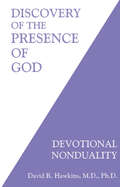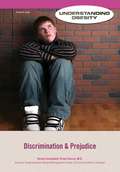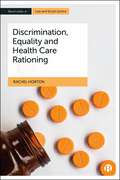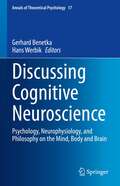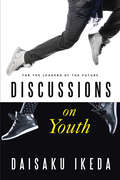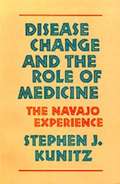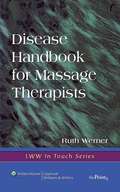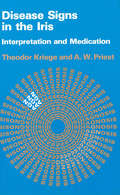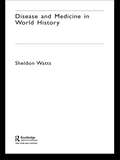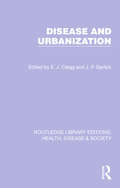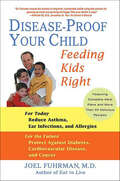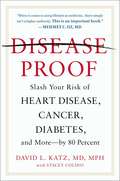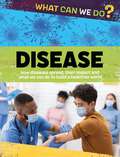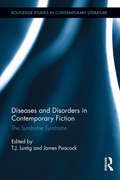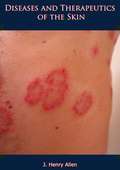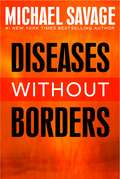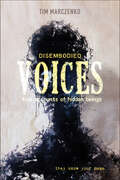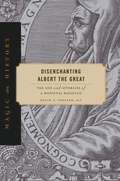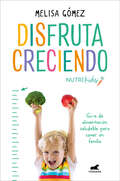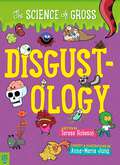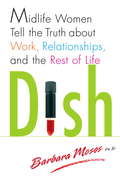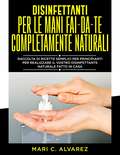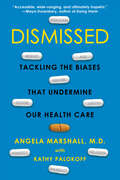- Table View
- List View
Discovery Works (Unit G, Growing Up Healthy)
by Silver Burdett GinnA healthful lifestyle includes physical well-being and a happy, well-balanced state of mind. This book describes a balanced diet and gives you simple exercises and activities to help you keep your body in good shape-and have fun, too!
Discovery of the Presence of God: Devotional Nonduality
by David R. HawkinsFinalizes and further clarifies the true nature and core of the condition termed "Enlightenment." It is primarily an instruction manual for the serious spiritual devotee, and reveals information only known by those who have transcended the ego to reach Divine Realization. This is the inner route from the self to the Self. The subjective states of the mystic are of great interest, but historically never have been clarified to the degree presented in this semi-autobiographical account that also provides the means by which to identify their rare occurrence, and thus describe the core characteristics of Spiritual Truth. Devoid of ecclesiastical doctrine or religious belief systems, the pristine essence of all spiritual Truth is revelaed in its purity with unprecedented clarity.
Discrimination & Prejudice
by Autumn LibalAround the world, many people face discrimination because of the shapes of their bodies, their weight, or the way they look. People who would never discriminate against others because of skin color or some physical challenge often think it's perfectly okay to judge others based on weight. Many of us don't think twice about judging other people's appearance--but most of us also know the pain of feeling bad about the way we look. Learn about the ways in which our culture discriminates against people who are overweight and obese. Discover the harmful effects of judgment and stigmatization when it comes to weight. Understand the myths that surround the causes and solutions for obesity--and get to know the facts. Find out the true costs of body-hate!
Discrimination, Denial, and Deportation: Human Rights Abuses Affecting Migrants Living with HIV
by Human Rights WatchThis 22-page report describes how discrimination and human rights abuses faced by migrant populations result in increased vulnerability to HIV infection and barriers to care and treatment.
Discrimination, Equality and Health Care Rationing (Bristol Studies in Law and Social Justice)
by Rachel HortonAvailable open access digitally under CC-BY-NC-ND licence. When deciding who to treat, those engaged in priority-setting and resource allocation in health care need to comply with their obligations under the Equality Act 2010. This book provides an in-depth examination of how anti-discrimination laws intersect with health care rationing in the UK. It critiques how existing legal frameworks apply to resource allocation, questioning whether and when utilitarian principles should be adjusted to incorporate anti-discrimination norms. The author offers detailed cases studies in the contexts of fertility treatment, public health and intensive care, highlighting practical implications and real-world challenges. This is a timely legal analysis, providing crucial policy insights in the wake of recent global health crises.
Discussing Cognitive Neuroscience: Psychology, Neurophysiology, and Philosophy on the Mind, Body and Brain (Annals of Theoretical Psychology #17)
by Gerhard Benetka Hans WerbikThe sciences philosophy, psychology and neuroscience share the basis that all refer to the human being. Therefore, an interdisciplinary collaboration would be desirable. The exchange of criticism is an essential requirement for interdisciplinary collaboration. Criticism must be heard and – if possible – considered. Indeed, criticism can be valid or unwarranted. However, whether criticism is unwarranted can only emerge from discussion and conversation. In the discussion of cognitive neuroscience, some criticism can easily be considered (such as the mereological fallacy that represents that talking about the person is substituted with talking bout the brain). Another issue for an interdisciplinary discussion of cognitive neuroscience is the interpretation of the readiness potential including re-considering Benjamin Libet’s classic experiments. Additionally, a critical discussion on cognitive neuroscience must address ethical questions, such as the possibility of the abuse of neuroscientific insight.
Discussions on Youth: For the Leaders of the Future (For the Leaders of the Future)
by Daisaku IkedaIn a straightforward question-and-answer format, Buddhist teacher Daisaku Ikeda responds to the complicated issued facing American young people. Addressing adolescents as the leaders of the future, Ikeda touches on topics of peace, human rights, and environmental degredation as he urges young people with warmth and understanding to see the great potential they have as the hope for humanity. The book also provides easy-to-understand explanations of Nichiren Buddhism and the benefits of its practice.
Disease Change and the Role of Medicine: The Navajo Experience
by Stephen J. Kunitz Charles M. LeslieStephen Kunitz's work raises crucial issues for public policy in the medical field, and will be valuable for social scientists, physicians, and health professionals concerned with the social context of public health and other medical facilities.
Disease Handbook for Massage Therapists
by Ruth WernerDisease Handbook for Massage Therapists is a quick reference for practicing massage therapists who need to make on-the-spot decisions on the applicability of their work when pathologies are present. The book covers a variety of conditions, listed alphabetically, and presents the following information on each condition: a brief definition and description, with associated diseases indicated in bold; a list of signs and symptoms; a description of common treatment options, particularly those that might influence choices about massage; a list of frequently recommended medications, which can be further explored in Drug Handbook for Massage Therapists; and a discussion of massage considerations, including risks, benefits, and advice for practitioners.
Disease Signs In The Iris: Interpretation and Medication
by Theodor Kriege A.W. PriestDisease Signs in the Iris is intended for those who already have knowledge of the basic principles of irisdiagnosis. Part 1 is a translation from the German of the original work on iris interpretation by Theodor Kriege: Krankheitszeichen in der Iris. The disease signs are considered and explained as shown in original iris photographs. With few exceptions the conditions depicted have been confirmed by special methods of diagnosis, such as radiographic and blood investigations, as well as by the findings of surgical operations. The monochrome photographs especially highlight the structural changes and contrast values. The original text has been translated by A.W. Priest, and in Part 2 he correlates the iris findings with appropriate herbal and biochemical medication.
Disease and Medicine in World History (Themes in World History)
by Sheldon WattsDisease and Medicine in World History is a concise introduction to diverse ideas about diseases and their treatment throughout the world. Drawing on case studies from ancient Egypt to present-day America, Asia and Europe, this survey discusses concepts of sickness and forms of treatment in many cultures. Sheldon Watts shows that many medical practices in the past were shaped as much by philosophers and metaphysicians as by university-trained doctors and other practitioners. Subjects covered include: Pharaonic Egypt and the pre-conquest New World the evolution of medical systems in the Middle East health and healing on the Indian subcontinent medicine and disease in China the globalization of disease in the modern world the birth and evolution of modern scientific medicine. This volume is a landmark contribution to the field of world history. It covers the principal medical systems known in the world, based on extensive original research. Watts raises questions about globalization in medicine and the potential impact of infectious diseases in the present day.
Disease and Urbanization (Routledge Library Editions: Health, Disease and Society #11)
by Clegg E. J. and Garlick J. P.Originally published in 1980, this book focusses attention on various aspects of disease ecology. A series of contrasts appear, between urban and rural, temperate and tropical, and affluent and poor communities. These socio-geographical contrasts are related to a further dichotomy between infectious (usually acute) diseases, and non-infectious (usually chronic) ones. The first part of the book is largely concerned with infectious disease, such as malaria and gastroenteritis, in rural/tropical/poor communities. The second discusses the often-antithetical combination of chronic disease in urban/temperate/affluent populations.
Disease-Proof Your Child: Feeding Kids Right
by Joel FuhrmanHarness the power of a nutrient-rich diet to give your child a healthy life with this guide featuring easy, kid friendly recipes.In his private practice, Joel Fuhrman, M.D. helps families transform their eating habits and recover their health. His nutrient-rich eating plan can have a significant impact on your child’s resistance to dangerous infections and reduce the occurrence of everything from asthma to ear infections. In Disease-Proof Your Child, Dr. Fuhrman explains how to insure your children maintain a healthy mind and body by eating right, and how eating certain foods and avoiding others can positively impact your child’s IQ and success in school. He also demonstrates how diseases that develop in adulthood, such as cancer and diabetes, are closely linked to what we eat in the first quarter of life—and how you can help your child establish the nutritional groundwork for a healthy life.
Disease-Proof: The Remarkable Truth About What Makes Us Well
by MPH David L. Katz Stacey ColinoThe skills you need to slash your risk of heart disease, cancer, diabetes, and more#151;by 80 percent Though we may not realize it, our behavior has tremendous effects on our health, well-being, and even gene expression. In Disease-Proof, renowned preventive medicine specialist Dr. David Katz reveals that we can reduce our risk of any chronic disease by an astonishing 80 percent#151;more than any drug or intervention could ever hope to do. Abundant scientific evidence shows that four simple things#151;not smoking, eating well, being active, and maintaining a healthy weight#151;play an enormous role in our health. Drawing upon the latest scientific evidence and decades of clinical experience, Dr. Katz arms us with the skills to make lasting changes in each of these areas. Disease-Proof equips readers with the knowledge to manage weight, improve immune function, reprogram our genes, and prevent and reverse life-altering illnesses. Groundbreaking and timely, this book is for readers of The End of Illness by David Agus and Anticancer by David Servan-Schreiber.
Disease: How Diseases Spread, Their Impact And What We Can Do To Build A Healthier World (What Can We Do? #3)
by Alex WoolfA look at one of the biggest challenges facing our world today - disease - and how we are tackling itDisease has always been part of the human experience, from huge pandemics to illnesses increasingly associated with unhealthy lifestyles and the world's ageing population. Medical technology has improved so dramatically that the rates of some illnesses are declining fast, while tests, vaccines and cutting edge surgery are making others much more survivable. But healthcare is not equal around the world and the Covid-19 pandemic highlighted just how vulnerable the world can be to a brand new disease. How can we make the world more healthy?How can we build a better, fairer, more equal, cleaner world? This series seeks to answer this by exploring some of the greatest challenges facing our planet today - from disease to conflict, and from the energy crisis to the plight of refugees. It explains what is already being done to meet and tackle these challenges, and explores what more could and should be done, both individually and collectively, to ensure a better future for our planet, its people and its wildlife.Taking a positive, but realistic perspective, this series aims to empower young readers by helping them understand these complex and troubling issues, calm their anxieties, and promote empathy and understanding for the many millions of people suffering from for example, poverty or inequality.Perfect for readers aged 9 and upTitles in the series:Climate ChangeDiseaseInequalityMigrationPoverty & Food InsecurityWar & Conflict
Diseases and Disorders in Contemporary Fiction: The Syndrome Syndrome (Routledge Studies in Contemporary Literature #10)
by James Peacock T. J. LustigThe essays in this collection address the current preoccupation with neurological conditions and disorders in contemporary literature by British and American writers. The book places these fictional treatments within a broader cultural and historical context, exploring such topics as the two cultures debate, the neurological turn, postmodernism and the post-postmodern, and responses to September 11th. Considering a variety of materials including mainstream literary fiction, the graphic novel, popular fiction, autobiographical writing, film, and television, contributors consider the contemporary dimensions of the interface between the sciences and humanities, developing the debate about the post-postmodern as a new humanism or a return to realism and investigating questions of form and genre, and of literary continuities and discontinuities. Further, the essays discuss contemporary writers’ attempts to engage the relation between the individual and the social, looking at the relation between the "syndrome syndrome" (referring to the prevalence in contemporary literature of neurological phenomena evident at the biological level) and existing work in the field of trauma studies (where explanations tend to have taken a psychoanalytical form), allowing for perspectives that question some of the assumptions that have marked both these fields. The current literary preoccupation with neurological conditions presents us with a new and distinctive form of trauma literature, one concerned less with psychoanalysis than with the physical and evolutionary status of human beings.
Diseases and Therapeutics of the Skin
by J. Henry AllenThe author was a teacher of skin diseases. A book which gives the description, etiology, diagnosis and treatment according to the law of similar.
Diseases without Borders: Boosting Your Immunity Against Infectious Diseases from the Flu and Measles to Tuberculosis
by Michael Savage<P>New York Times bestselling author and expert in epidemiology Dr. Michael Savage explains the origins of viruses and their impact on the U.S. <P>With new and resurgent diseases resulting from unregulated immigration and a politicized public health system, Michael Savage sees the need for some changes - starting with the President and the Center for Disease Control telling us the truth. <P>Savage makes his case for the government to enforce travel bans, the use of quarantines and the importance of proper border screenings. <P>However, this is not a cure or treatment for any of these diseases. With Zika virus, tuberculosis, hepatitis, Enterovirus 68 and other new disease threats emerging across the U.S., Savage will explain ways to fortify your immune system and defend against these and other diseases. <P>Drawing from his extensive training, Dr. Savage examines the benefits of using specific nutrients to boost the human immune system which, in turn, increases the odds of surviving a viral infection as well as preventing other diseases. <P>Based on his knowledge of the politics of medicine being played by the Obama mandarins and his Ph.D. in Epidemiology and Nutrition from the University of California, Berkeley, Dr. Savage presents solid information to protect your health. <P>Whether you want to defend your body against deadly diseases, boost your immunity, or learn more about the government's impact on reemerging and imported diseases, DISEASES WITHOUT BORDERS is your source for informative, helpful, and potentially life-saving advice. <P><b>A New York Times Bestseller</b>
Disembodied Voices: True Accounts of Hidden Beings
by Tim MarczenkoA paranormal investigator reveals evidence of mysterious voices that communicate with us—and hair-raising theories about who they are and what they want. For millennia, people have had encounters with voices that seem to come from nowhere. These disembodies voices have haunted and helped us, inspired and scared us. But few have stepped forward to discuss the phenomenon. Now Tim Marczenko reveals true stories from his extensive investigation into real-life encounters with disembodied voices, as well as historical accounts and his own personal experiences. With objectivity and healthy skepticism, Tim explores theories about why these voices exist, where they may be coming from, and what their agendas may be. Are they forgotten woodland deities? Is it an ancient evil from the days of Eden? Is there a single intelligence behind them all . . . or perhaps we shouldn&’t look too deeply . . . or else . . .
Disenchanting Albert the Great: The Life and Afterlife of a Medieval Magician (Magic in History)
by David J. Collins, S. J.Albert the Great (1200–1280) was a prominent Dominican friar, a leading philosopher, and the teacher of Thomas Aquinas. He also endorsed the use of magic. Controversial though that stance would have been, Albert was never punished or repudiated for what he wrote. Albert’s reception followed instead a markedly different course, leading ultimately to his canonization by the Catholic Church in 1931. But his thoughts about magic have been debated for centuries. Disenchanting Albert the Great takes Albert’s contested reputation as a case study for the long and complex history surrounding the concept of magic and magic’s relationship to science and religion. Over the centuries, Albert was celebrated for his magic, or it was explained away—but he was never condemned. In the fifteenth century, members of learned circles first attempted to distance Albert from magic, with the goal of exonerating him of superstition, irrationality, and immorality. Disenchanting Albert the Great discusses the philosopher’s own understanding of magic; an early, adulatory phase of his reputation as a magician; and the three primary strategies used to exonerate Albert over the centuries. In the end, Disenchanting Albert the Great tells the story of a thirteenth-century scholar who worked to disenchant the natural world with his ideas about magic but who himself would not be disenchanted until the modern era. This accessible and insightful history will appeal to those interested in Albert the Great, Catholic Church history, the history of magic, and Western understandings of the natural and the rational over time.
Disfruta creciendo: Guía de alimentación saludable para comer en familia
by Melisa GómezDisfruta creciendo es el primer libro en solitario de Melisa Gómez, coautora, junto a Juan Llorca, del best seller Sin dientes y a bocados. En este libro fundamental, la autora nos ofrece una detallada guía de alimentación infantil que nos acompañará durante todas las etapas de crecimiento de nuestros hijos: desde la nutrición durante el embarazo y la lactancia, pasando por la alimentación complementaria y las necesidades nutricionales de los niños en la etapa escolar, hasta la llegada a la adolescencia, sin olvidar las opciones plant-based en todos estos periodos. El resultado es un manual de consulta imprescindible sobre la alimentación infantil, pensado con un enfoque práctico para resolver todas aquellas dudas esenciales que rodean la alimentación y la salud de nuestros hijos, así como las comidas y las cenas familiares del día a día, con valiosas recomendaciones, corroboradas por la evidencia científica actual. Los lectores encontrarán la manera de abordar la alimentación infantil de una forma global, fl exible y respetuosa, para que puedan decidir cuáles son las mejores alternativas para sus hijos, disfrutando junto a ellos con la seguridad de que sus necesidades nutricionales están cubiertas. «Será importante recordar que los hábitos que se instauran en la infancia acompañarán a los niños hasta la vida adulta, por lo que debemos seguir trabajando para dotarlos de herramientas que les permitan llevar una vida saludable y convertirse en los adultos sanos y felices que esperamos que sean».
Disgustology: The Science of Gross
by Teresa RobesonPerfect for middle schoolers who love everything gross from the nasty things inside (and out) of our bodies to icky animals, revolting plants, gruesome bacteria, and more. Written by award-winning author Teresa Robeson, this book is packed full of fun facts and silly science, along with truly eye-popping illustrations and photographs that make intestines, boogers, ringworms, fecal coliforms, and brain eating amoeba even more vivid and visceral. Readers will be gagging and giggling at the same time. It's truly the most disgusting book ever!
Dish
by Barbara MosesWomen at Mid-life Tell the Truth about What Really Matters in Work, Relationships, and the Rest of LifeFrom the bestselling author of What Next? comes a deliciously frank and inspiring look at contemporary women and the life choices they make."I am feverish with all the possibilities," says one woman, of her life now. "I lost myself, my sense of being because I had to conform to an alpha male world. I would come out of meetings sick to my stomach, not because of what had happened in the meeting but because of what had happened to me," says another of her life in a corporate organization. So just what does this generation of women, the first to "have it all," have to say for themselves today? Lots, it turns out. Rueful, funny, bitchy, wise, women at mid-life are tired of trying to please and continually biting their tongues. They have worked, married, had children, divorced, chosen to stay home, and learned lots of life's lessons -- and they are more than happy to dish it all out for us.Through the skilful lens of renowned life coach Dr. Barbara Moses, the voices of over one thousand women are focused on the issues surrounding career, family, love and sex, friendship, and society. Through them, we see a brilliant snapshot of an entire generation, one that first tackled the glass ceiling and fought for equality at home and at work. We hear what they think of their lives now, of the choices they have made, what has made them happy, and what they would change for the second half of their lives. In Moses's capable hands, these voices become welcome advice from a host of friends, a road map for future choices. Dish is addictively readable and full of wisdom, and it will change the face of self-help. A sample of the voices in Dish:"My boss, the VP of HR, said, 'We really need to promote work-life balance in the company. Let's have a meeting Monday morning at seven-thirty to discuss it.'""I'm proud of myself for ending the marriage . . . asserting my right to feel good about my life and being strong enough to do it.""I practise Marxist (Groucho) monogamy. I wouldn't have an affair with anyone who would have an affair with me."From the Trade Paperback edition.
Disinfettanti per le mani fai da te completamente naturali: Guida di semplici formulazioni per principianti, per farvi un disinfettante naturale fatto in casa
by Mari C. AlvarezUna guida semplice da seguire per farvi in casa il vostro disinfettante per le mani. Davanti a una sempre maggiore consapevolezza generale di una nuova epidemia, i disinfettanti per le mani sono diventati difficili da trovare. Questo libro vi offre l’opportunità di imparare “Come fare il vostro disinfettante per le mani fatto in casa”, che è non solo importante ma essenziale per voi e per la vostra famiglia, per liberarvi da portatori di malattie come batteri e virus. Comincia con la presentazione dei disinfettanti fatti in casa, la loro importanza e i loro effetti sulle infezioni batteriche e i virus. In questo libro imparerete anche: Come fare disinfettanti usando diverse formule: ingredienti economici, erbe medicinali, oli essenziali, alcol, prodotti chimici, diverse formulazioni con oli essenziali. Una preparazione illustrata passo a passo, precauzioni e sicurezza. Questo libro vi accompagnerà lungo tutto il processo, per gradi. Allora, cosa state aspettando? Trovate il bottone “BUY NOW” nella pagina, e scaricate ora la vostra copia! Vi aspetto!
Dismissed: Tackling the Biases That Undermine our Health Care
by Kathy Palokoff Angela MarshallFacts—women in pain are much more likely than men to receive prescriptions for sedatives rather than pain medication; Black women are more than three times more likely than white women to die of childbirth-related causes. Whether it&’s age, body size, sexual orientation, or other cultural factors, bias in healthcare is an uncomfortable truth. In this first-ever book on the subject written from the author&’s unique perspective of being a doctor, a woman, and Black, Dr. Angela Marshall, a contributing health expert on CNN, Fox5 News and Let&’s Talk Lives, and repeatedly named a &“Top Doctor&” by Washingtonian magazine, candidly addresses the life-and-death issue, sharing personal and patient stories and fresh, pragmatic solutions. Have you ever felt you were treated differently by a medical professional due to your skin color, age, ethnicity, gender, or for any other reason? If so, you are far from alone. Here&’s the uncomfortable truth: Race, ethnicity, gender, sexual orientation, age, body size, and other cultural factors have a significant bearing on whether you will be diagnosed and treated correctly. Health-care providers and their patients are human, and all humans have unconscious biases that affect how we listen, observe, and act. Bias impacts patients when they are at their most vulnerable. Health-care bias can mean the difference not just between suffering and relief, but between life and death. For the first time, an author with the unique perspective of being one of America&’s top doctors, a woman, and Black, candidly addresses the issue of bias in health care, sharing personal and patient stories and pragmatic solutions. Dr. Angela Marshall, repeatedly named a &“Top Doctor&” by Washingtonian magazine, draws on extensive research, poignant stories from some of the thousands of patients she has treated, and her own compelling personal experience, to examine the bias from both patients&’ and health‑care providers&’ points of view. She offers a bold blueprint for change, filled with fresh solutions that can help everyone in our health-care system. Dismissed not only explains what so many people feel so profoundly—that the system is working against them. It also reveals what health-care practitioners, patients, and society in general can do to make it right.

